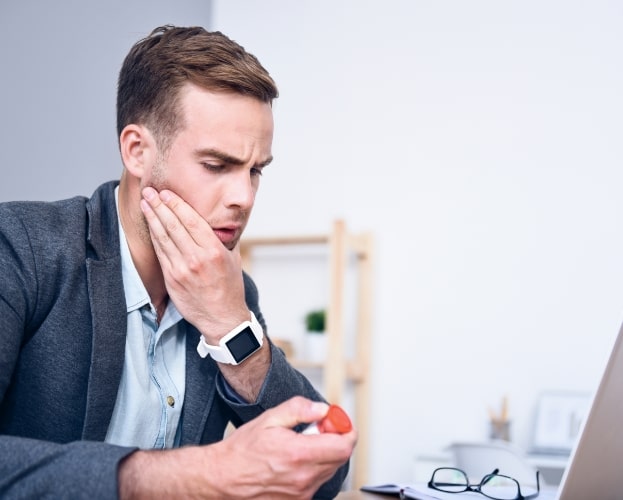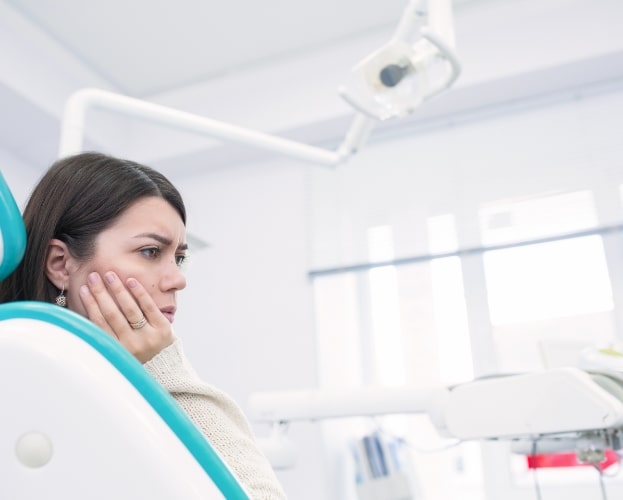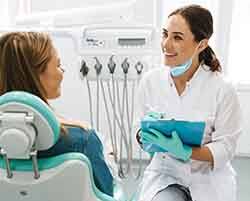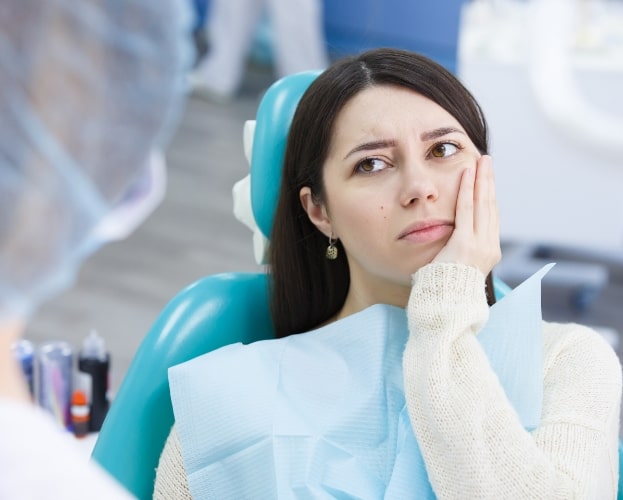Emergency Dentistry – Dudley, MA
Quickly Getting You Out of Dental Pain

Few things ruin your day as suddenly as a dental emergency. Not only are you in pain, but you might not have any idea what to do next. If you find yourself with a dental emergency, all you need to do is call Dudley Family Dental. From there, our team will do everything we can to get you the treatment you need as soon as possible. Don’t delay – contact us right away to get fast, smile-saving emergency dentistry in Dudley, MA!
Why Choose Dudley Family Dental for Emergency Dentistry?
- Evening Dental Appointments Available
- Insurance-Friendly Dental Office
- In-House Endodontist Performs Safe, Comfortable Root Canals
How We Treat Dental Emergencies

When you call us with an urgent dental problem, here’s what you can expect our team to do to help:
- Get an appointment – Over the phone, a member of our team will ask you about your symptoms to determine how quickly you need to come in. Then, we’ll schedule an appointment for you and even give you tips for managing your symptoms until then.
- Perform an emergency exam – Once you arrive, Dr. Kamil or Dr. Hiba will look at your mouth and take any X-rays necessary to diagnose the issue.
- Share our findings – Our dentists will review the results of their exam and recommend a treatment plan to stop your emergency in its tracks.
- Heal your smile – After we’ve gone over your treatment and the associated costs, we’ll get work on repairing your smile right away.
The Most Common Dental Emergencies
It might be difficult to tell whether you have a “real” dental emergency on your hands, especially if your discomfort is relatively mild. However, we highly suggest that you call us even if you’re not sure that you need urgent treatment. When it comes to your smile, it’s better to be safe than sorry! Below, you’ll find some examples of the types of dental emergencies that we see the most often.
Understanding the Cost of Emergency Dentistry

Since the cost of your emergency dental care will depend on the specific situation you’re dealing with as well as which procedures are required to address it, we can’t give you an estimate of the cost here. We can, however, provide some insight into the factors that influence the price, including if you can use your dental insurance to lower your out-of-pocket expenses. So, read on!
Every Dental Emergency is Different

As we alluded to above, no two dental emergencies are exactly the same. After all, one patient might visit us because their tooth has been hurting for several days, and the next might come in for same-day treatment because they knocked out a tooth. Even two patients with the same symptoms, like persistent dental sensitivity, may require two completely different treatments! That’s why it’s so important that we complete a comprehensive oral exam before recommending a restorative service or providing you with a price estimate.
Does Dental Insurance Cover Dental Emergencies?

Do you have dental insurance? If so, you’ll be happy to hear that providers often cover a portion of the cost – whether that’s the emergency exam or 50%-80% of the cost of the restorative care needed. Whatever the case may be, there’s more good news: our team at Dudley Family Dental welcomes dental insurance. Plus, we’re here to make utilizing your available benefits easy by answering any questions you have, handling the paperwork, and doing whatever we can to minimize your out-of-pocket expenses.
Other Options for Making Dental Emergencies Affordable

If you don’t have dental insurance at the moment, don’t worry – that doesn’t mean you’re simply stuck with the bill. After all, our Dudley dental team welcomes flexible financing with CareCredit! This means that you can space out your payments into smaller, more manageable monthly chunks (sometimes with little-to-no interest too). If this sounds like the financial solution you’ve been looking for, then don’t hesitate to reach out to us to get further information, including how to sign up.
Taking Care Of Your Smile Can Save You Money

All too often, patients forget something very important: dental injuries, like decayed, cracked, and chipped teeth, are largely preventable! If you brush and floss consistently, then your chances of developing a cavity diminish considerably. If you wear a mouthguard during sports, you’re much less likely to knock out a tooth. If you come to our office every six months for a dental checkup and teeth cleaning, we can catch problems before they require same-day care. In short, make sure to prioritize preventive care; it benefits your smile and your wallet!
Keys to Preventing Dental Emergencies

Since accidents happen, it’s virtually impossible to prevent a dental emergency from ever happening. With that said, you can drastically lower your risk by taking a few precautions. Our team at Dudley Family Dental recommends:
Visiting Your Dentist Regularly

It’s imperative that you get a dental checkup and cleaning twice a year. Why? To start, the exam ensures that cavities, oral cancer, damaged restorations, and the like are caught as early as possible. Furthermore, plaque and tartar are removed during the cleaning, which can only be done with the special tools we have at our office. So, if it’s been more than six months since your last visit, schedule your next one today!
Maintaining Good Oral Hygiene At Home

Keeping your teeth and gums healthy requires a commitment to a solid at-home oral hygiene regimen. So, if you aren’t consistently brushing, flossing, and rinsing with mouthwash, now is the time to start! This will help prevent a wide range of dental problems – from persistent dental sensitivity and gum disease to large cavities.
Note: If you are ever unsure of what products to use, how to floss your teeth properly, or have any questions about how to keep your teeth and gums healthy from home, don’t hesitate to ask!
Sticking to a Nutritious Diet

Filling your plate with vegetables, lean protein, healthy fats, and fresh fruit benefits your smile in several ways – from helping your body fight infections to keeping your jawbone strong. We also encourage our patients to keep their consumption of sugary and starchy foods to a minimum since they can lead to oral health problems, like tooth decay. In short, sticking to a nutrient-dense diet doesn’t just benefit your overall health, it benefits your oral health!
Wearing a Mouthguard

Whether you enjoy playing basketball with friends, you’re on your school’s track teeth, or you enjoy participating in a solo sport, like skateboarding, you need to wear a mouthguard. That way, your teeth are protected in case you accidentally fall or a rogue ball hits you square in the jaw.
Note: We also recommend wearing a mouthguard if you clench or grind your teeth at night to prevent premature wear, chronic jaw pain, and other painful consequences.
Using Tools to Open Packages, Not Your Teeth

If you’re having trouble opening a package with your hands, do you use your teeth instead? Is your “party trick” that you can remove a bottle cap with your teeth? Do you ever use your teeth to hold items when your hands are full, like your keys? If so, now is the time to stop! Using your teeth as tools dramatically increases your chances of winding up in our office with a chipped, cracked, or fractured tooth.
Dental Emergency FAQs
Should I visit the emergency room first for dental emergencies?
Did you know that hospitals typically don’t have dentists on staff? So, if you go to the ER with a toothache, loose restoration, or something similar, they can really only do one thing: alleviate your discomfort. That’s why it’s best to visit your dentist, not the ER.
Important note: If your dental injury is accompanied by a potentially life-threatening symptom, like difficulty breathing, trouble swallowing, or uncontrollable bleeding, then you should absolutely head to the ER or call 911 for medical attention.
Will my toothache go away on its own?
Since tooth decay, gum disease, and other oral health problems won’t go away without the necessary restorative care, the answer is “no.” For that reason, we recommend reaching out to our Dudley team when abnormal dental symptoms first arise, like pain when biting down. That way, we can determine the root of the problem and provide the necessary treatment (or treatments) when it’s still manageable.
How should I sleep with tooth pain?
If you’re struggling with tooth pain, but your dental appointment isn’t until the following morning, you’ll be happy to hear that there are a few short-term solutions that will help you sleep soundly. The first is sticking to soft foods at dinner, preferably ones that aren’t sugary, spicy, or acidic. The second is using a cold compress for 10 minutes at a time to alleviate inflammation and provide a temporary numbing sensation. The third is taking OTC pain medication about 30 minutes before bed (never take more than the recommended amount). The fourth is propping yourself up on a few pillows to keep your head elevated.
What does throbbing tooth pain mean?
Throbbing tooth pain could be the result of everything from a crack in your enamel to inflammation or an infection. Simply put, it’s a sign that something is wrong, so you shouldn’t hesitate to schedule an emergency exam with our Dudley dental team. From there, one of our dedicated dentists will determine the source of your discomfort and, perhaps more importantly, the best way to address it.
Do I need to visit for minor chips to teeth?
Significant dental damage absolutely warrants an emergency visit, but what about minor damage, like a small chip? The short answer is “yes.” That’s because – even if you aren’t in pain – an infection can develop, or the tooth can break further. Simply put, while you may not need to come in the very same day for an exam, it’s a good idea to come to our office before the end of the week for one.
What is causing my jaw pain?
Chronic jaw pain is often the result of impacted wisdom teeth, nighttime grinding or clenching, or TMJ dysfunction. Of course, it’s also possible for it to be tied to something else, like arthritis, which is why we need to conduct a comprehensive oral exam. Once we determine what’s causing your discomfort, we can determine how to alleviate it!
I Need a Checkup & Cleaning I Have a Cavity or Broken Tooth I am Missing One or More Teeth I am Worried About Bleeding Gums I Want to Enhance My Smile I Need a Dentist for My Child View Our Services
